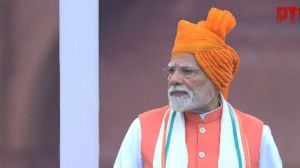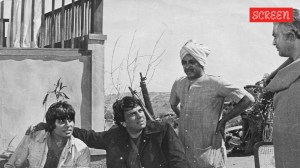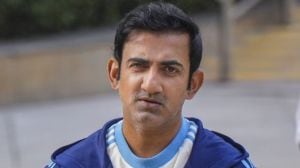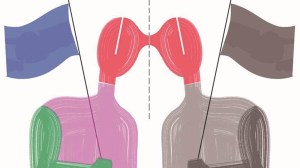‘Wo coffee ke shaukeen the… I served him a cuppa two days before he became PM’: A Delhi School of Economics old-timer remembers Dr Manmohan Singh
The moment Manmohan Singh’s name is mentioned, Dada’s inscrutable face starts to display emotion, says Amardas Gupta (77) who has been running the college canteen for decades.
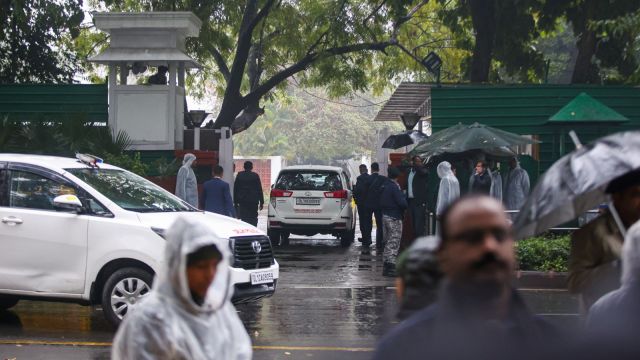 Outside former Manmohan Singh’s home (Express)
Outside former Manmohan Singh’s home (Express)Sugarless coffee from Indian Coffee House every morning for two years — this was the regimen of the late Manmohan Singh, India’s former PM and architect of opening the country’s economy, during his stint as a professor of International Trade at the Delhi School of Economics (DSE) from 1969 to 1971, according to Amardas Gupta (77) who has been running the college canteen for decades.
Gupta, endearingly called Dada by the college, is the oldest regular employee at DSE. The Indian Coffee House is now simply known as the canteen.
The moment Manmohan Singh’s name is mentioned, Dada’s inscrutable face starts to display emotion. “You know, I’ve served Manmohan Singh coffee,” he says proudly, addressing a recalcitrant student who hasn’t paid his pending bills. “Sir, I will pay you. Please give me tea so I can also grow up to be like Manmohan ji,” replies the student instantly. This brings a smile to Dada’s face and he directs the staff to prepare tea for the student.
“I used to be very fond of him (Singh)…,” he says. “The thing I liked most about him was that he used to speak very softly (bahaut aahista aahista baat karte the). He would talk in English with his friends but he would make sure to greet me every time.”
“Wo coffee ke shaukeen the… PM banne se do din pehle wo mere haath ki coffee piye the (He was very fond of coffee… I served him coffee two days before he became the PM),” adds Gupta.
 Manmohan Singh’s books in D-School library (Express)
Manmohan Singh’s books in D-School library (Express)
Scratching his head over the beige cap he was wearing, Gupta reminisces that the last time he met Singh was almost 10 years ago: “He lived like a common man… Even after becoming the PM when he visited the canteen, he drank coffee sitting right between the students.”
While the former PM spent only two years teaching at the college, he was revered by students and teachers alike.
“He was respected by everyone. We knew he was sick but you know how it is — we kept thinking he’ll pull through,” says Nandita Mongia, retired United Nations Climate Change Mitigation team leader, Asia Pacific Division. She studied International Finance under Singh at DSE.
“International finance was not a very large class. All the students were in close touch with him. He was a very gentle, patient, and thorough teacher. He knew so much and yet was so humble. We were very proud just to be his students,” adds Mongia. “It was unusual for someone so busy to take out the time for his students… he would always enquire about us even after we had graduated.”
She tells The Indian Express that Singh attended her wedding reception in 1973.
‘He was helpful and kind’ — that’s how his colleagues describe him
“I had the proud privilege of being a colleague of Prof Manmohan Singh at DSE. I found him to be an extremely helpful and kind man, always willing to help his younger colleagues in whatever ways he could..,” says Professor Om Prakash, a member of the Centre for Development Economics at DSE.
DSE director Ram Singh says the fraternity is saddened at his passing away. “… He was the chief architect of the 1991 reforms and carried out several transformative reforms that set our economy on a fast growth path. As PM, he positioned India as an important player in the emerging geopolitical order. He was a source of constant support to DSE and would visit the school on several important occasions. Soon after becoming the PM, he visited DSE in January 2006,” he adds.
In fact, when DSE celebrated its 50th anniversary in 2008, an invitation was extended to Singh. “His security turned me down, saying that due to security reasons, the PM cannot make it,” recalls Santosh Panda, former director of the institution.
“We insisted the letter be shown to Dr Singh personally, as we knew how much D School meant to him. We were confident he wouldn’t turn this down. We were right. He accepted our invite and showed up,” he says.
“His affection for D School was immaculate. He valued it deeply and never hesitated to connect with us despite his towering responsibilities,” Panda says.
 Amardas Gupta, who runs D-School canteen, says he served Singh coffee for two years (Express)
Amardas Gupta, who runs D-School canteen, says he served Singh coffee for two years (Express)
Bina Agarwal, former Director and Professor of Economics at the Institute of Economic Growth, currently also a professor at the University of Manchester, says Singh “called himself an ‘incidental finance minister,’ but his contributions were far from incidental”.
Her memories of tea sessions with Singh at his residence revealed a man who balanced professional brilliance with deep familial affection. “He would speak with great pride about his daughters, especially Amrit, a deeply committed human rights lawyer,” she recalls.
“In turn, he would ask about my family, especially my father, whom he had known and greatly respected as a fellow civil servant,” Aggarwal adds.
For Pulin Nayak, former director of DSE, Singh was “a learned scholar and a practical policymaker”.
Indrani Gupta, professor at the Institute of Economic Growth (IEG), remembers his humility and grace. “I met Dr Singh on two occasions in IEG… I had the honour and privilege to speak to him personally. What remains with me is his utmost humility — for a person of his stature, achievement, brilliance and position — he had so much grace and modesty, it is truly rare.”
Back on campus, a stone’s throw from Dada’s canteen is JP tea stall. Jayprakash, the owner, started it in 1970, a year after Singh joined DSE. Today, he is in his village and the shop is being run by his son. “I never interacted with him (Manmohan Singh) personally, but I remember I saw him walking around the campus during an interview,” said JP’s son.
A few metres away from the stall is the college library. Kept on a table there is a nearly two-foot-high collection of books — stacked on top of each other — all written by Singh. Among these are six volumes of “Changing India”, “Demand Theory and Economic Calculation in a
Mixed Economy” and “Making Democracy Work for Pro-poor Development”.
Panda concludes that Singh may have been a man of few words but offered long-lasting solutions to every problem.
“And he had a definite love for samosas, sweets, and dhokla, which he enjoyed without pretension.”



